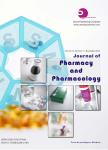Antidepressant Drugs Modulate Differentially Anti-inflammatory Lithium's Property: An in Vitro and in Vivo Study
Antidepressant Drugs Modulate Differentially Anti-inflammatory Lithium's Property: An in Vitro and in Vivo Study作者机构:Graduate Program in Pharmacology Federal University of Santa Maria Santa Maria-RS 97105900 Brazil Brain Institute Catholic University of Rio Grande do Sul Porto Alegre-RS 91410000 Brazil Graduate Program in Pathology Federal University of Health Sciences of Porto Alegre Porto Alegre-RS 90050170 Brazil Open University of the Third Age State University of Amazonas Manaus-AM 69029040 Brazil Lutheran University of Brazil Santa Maria-RS 97030080 Brazil
出 版 物:《Journal of Pharmacy and Pharmacology》 (药剂与药理学(英文版))
年 卷 期:2018年第6卷第4期
页 面:287-304页
学科分类:1007[医学-药学(可授医学、理学学位)] 08[工学] 081201[工学-计算机系统结构] 0812[工学-计算机科学与技术(可授工学、理学学位)] 10[医学]
主 题:Mood disorders inflammation selective serotonin reuptake inhibitors bipolar disorder lithium.
摘 要:Li (lithium), a mood stabilizer has anti-inflammatory effect. However, in clinical practice, Li can be administered together with other antidepressants drugs, such as FLX (fluoxetine), IMI (imipramine), NOR (nortriptyline) and ESC (escitalopram). As interaction between Li and these antidepressant drugs on inflammatory modulation has not been investigated yet, we performed an in vitro protocol using a non-human macrophage cell line. Oxidative and inflammatory markers, as well as cell cycle analysis and cytokine gene expressions were compared among treatments. An IR (inflammatory ratio) was calculated based on the following oxidative-inflammatory variables: nitric oxide, superoxide anion, reactive oxygen molecules, cytokines IL-113, IL-6, TNF-ct and IL-10. The in vitro calculated IR data were validated through an in vivo analysis of 154 human subjects with similar IR. Li and control cells presented similar IR values. FLX, NOR and IMI increased slightly IR values indicating some proinflammatory effect, whereas ESC decreased IR values indicating some anti-inflammatory effect. However, cells exposed to Li + ESC triggered a proinflammatory response on macrophages. Thus, IR comparison results suggest that the Li anti-inflammatory effect is not universal and could be influenced by both basal macrophage-inflammatory state and interaction of other psychiatric drugs. These results could be useful to understand some inconsistencies observed in human studies involving Li and other psychiatric drugs.



